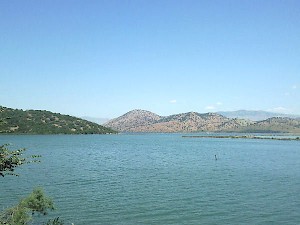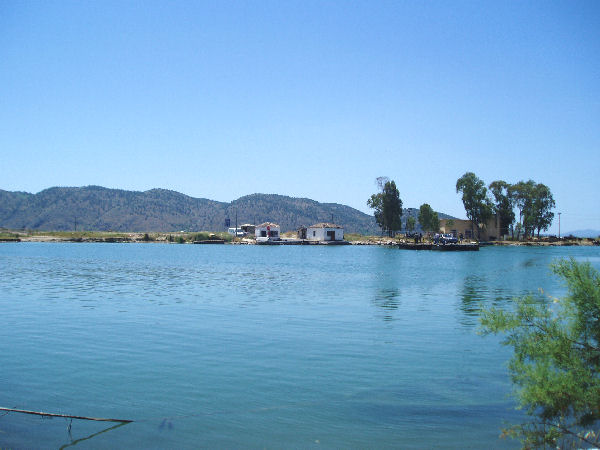Lake Palodes
Lake Palodes or Pelodes: lagoon near ancient Buthrotum.

Lake Palodes is the lagoon east of Buthrotum, separated from the Ionian Sea and the Strait of Corfu by the Poseidium, which is now known as the Ksamil Peninsula. The lagoon, which is full of fish and mussels, is connected to the sea by the Vivari Channel, which is about two kilometers long. Lake Palodes is mentioned in one of the most famous stories from Antiquity, told by the Greek writer Plutarch:
The father of Aemilianus the orator, to whom some of you have listened, was Epitherses, who lived in our town and was my teacher in grammar. He said that once upon a time in making a voyage to Italy he embarked on a ship carrying freight and many passengers. It was already evening when, near the Echinades Islands, the wind dropped, and the ship drifted near Paxi. Almost everybody was awake, and a good many had not finished their after-dinner wine.
Suddenly from the island of Paxi was heard the voice of someone loudly calling Thamus, so that all were amazed. Thamus was an Egyptian pilot, not known by name even to many on board. Twice he was called and made no reply, but the third time he answered; and the caller, raising his voice, said, "When you come opposite to Palodes, announce that Great Pan is dead."
On hearing this, all, said Epitherses, were astounded and reasoned among themselves whether it were better to carry out the order or to refuse to meddle and let the matter go. Under the circumstances Thamus made up his mind that if there should be a breeze, he would sail past and keep quiet, but with no wind and a smooth sea about the place he would announce what he had heard. So, when he came opposite Palodes, and there was neither wind nor wave, Thamus from the stern, looking toward the land, said the words as he had heard them: "Great Pan is dead."
Even before he had finished there was a great cry of lamentation, not of one person, but of many, mingled with exclamations of amazement. As many persons were on the vessel, the story was soon spread abroad in Rome, and Thamus was sent for by Tiberius Caesar. Tiberius became so convinced of the truth of the story that he caused an inquiry and investigation to be made about Pan; and the scholars, who were numerous at his court, conjectured that he was the son born of Hermes and Penelope.note
 This anecdote, made famous by Christians who presented it as evidence that the pagan gods had died in the age of Christ, is known from many cultures and is a typical folk tale. One parallel: near the Dutch village of Hogeloon is the Kabouterberg ("gnome mountain"), a Roman funeral mound belonging to an ancient villa, once believed to have been the residence of a gnome king named Kyrie. A hunter out on the Riethoven field - incidentally the site of another settlement from the Roman age - was requested by a strange voice to announce at the Kabouterberg that king Kyrie had died; so he walked to Hoogeloon, delivered the message, and was greeted by loud laments.
This anecdote, made famous by Christians who presented it as evidence that the pagan gods had died in the age of Christ, is known from many cultures and is a typical folk tale. One parallel: near the Dutch village of Hogeloon is the Kabouterberg ("gnome mountain"), a Roman funeral mound belonging to an ancient villa, once believed to have been the residence of a gnome king named Kyrie. A hunter out on the Riethoven field - incidentally the site of another settlement from the Roman age - was requested by a strange voice to announce at the Kabouterberg that king Kyrie had died; so he walked to Hoogeloon, delivered the message, and was greeted by loud laments.